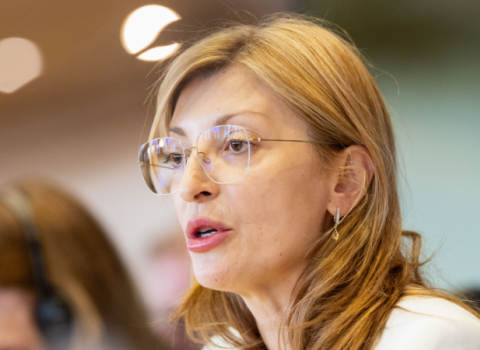
Valerie Pécresse: making the ERA “truly border-free”.
Valerie Pécresse, French minister for higher education and research, managed to turn a European Commission wish list into a forward-looking strategy dubbed Vision 2020, and it convinced its 26 EU neighbours to support the vision, ending months of uncertainty about the whole project.
Creation of the European Research Area (ERA) amounts to no less than the creation of a fifth freedom: the free movement of knowledge, to sit alongside four cornerstones of the EU, namely the free movement of people, goods, services and capital.
Pécresse described the political agreement she helped engineer as the first step in the so-called Ljubliana Process – a timetable drawn up by the previous Slovenian presidency of the EU in the first half of this year.
“Member states wished to organise this Vision 2020 around three strong ideas. The first is that the ERA must be firmly anchored in European society to meet its needs and its ambitions. The second is that the ERA is the road towards excellence and is also the driving force for European competitiveness. Finally, ERA must be a truly border-free area that promotes the free movement of knowledge,” she said after the two-day meeting at the beginning of the month.
The agreement was welcomed by many observers close to the research community.
“Vision 2020 is a major step towards coordinating Europe's national research programmes and sets out a political strategy to integrate Europe’s research efforts, the European Research Area,” said EuropaBio, a biotech trade group, in a statement.
“As such, Vision 2020 represents an important step forward in the development of a competitive knowledge-based economy, a key element of the Lisbon strategy,” it added.
Vision 2020 will supersede the Lisbon strategy, which set targets for change that would make Europe the most competitive and dynamic knowledge-based economy in the world by 2010.
The aim of this vision is to offer researchers attractive conditions to move to the best research organisations in the Union, which should be able to strengthen their competencies as they compete for public and private funds across borders and have access to the best research infrastructures irrespective of their location.
Securing political agreement behind the initiative was no small feat. Earlier this year many member states, including the UK and the Netherlands, questioned the merits of pooling research resources at the EU level.
But there was little, if any, sign of dissent at the meeting. Member states were even willing to go beyond the Vision thing by signing up to a Commission idea launched in July to conduct joint research programming to tackle some of the biggest challenges facing the EU in the short to medium term.
When the Commission launched the idea many onlookers said this would be a step too far. National research programmes have until now been used as a way to boost domestic research. The agreement reached by ministers marks a sea change in research policy thinking.
And to prove they mean it the ministers launched a joint programming pilot experiment devoted to combating Alzheimer’s disease – an idea France has been promoting ever since it took over the EU presidency in July.
Joint programming “is an instrument that will allow us to make a great step towards coordinating the European research effort, which is insufficient as it is”, Pécresse said.
“ERA defines the European way to excellence in research and is a major driver of European competitiveness,” the ministers said in a joint statement.





 A unique international forum for public research organisations and companies to connect their external engagement with strategic interests around their R&D system.
A unique international forum for public research organisations and companies to connect their external engagement with strategic interests around their R&D system.